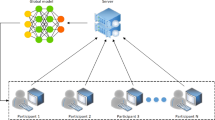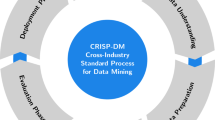Abstract
Federated learning (FL) is an emerging technique used to preserve the privacy of users’ data in training by a distributed machine learning approach. Previously, a client-edge-cloud hierarchical federated learning (HierFL) system was proposed to reduce the long communication latency between the client and the cloud. However, HierFL performs very poorly at extracting better features from the data in the client, which is also a common drawback of traditional FL architectures. HierFL also constrains the its hierarchy to server-edge-client three levels which is very restrictive. This paper proposes that the specifically designed FL architecture can naturally have an excellent effect on feature extraction. Specifically, this paper proposes a multibranch multilevel federated learning (MBMLFL) framework to perform a better job at feature extraction, and each branch and level has its own self specific effect. The proposed framework is also friendlier as well as further enhances the privacy. By extending FedAvg, we design an M2DCFedAvg algorithm for the framework to optimize its objective function distributedly, and by conducting numerous experiments and analyses, we propose a general epoch selection principle for all the FL methods: the \({1^{T}_{d}}\)-n principle. Experiments with various data distributions are performed on MBMLFL to comprehensively research its characteristics. Moreover, to complete the personalization ability of our framework, we propose a plug-and-play dynamic-adjusting double flow personalization approach (DADFPA) for our MBMLFL method, which will further enhance the ability of the MBMLFL, such that it comprehensively and adaptively satisfies the generalization and personalization needs of clients. Experiments show that the MBMLFL and DADFPA can improve their baselines by an average of 5.26% and 2.24% points, which demonstrates their excellent performance.







Similar content being viewed by others
Change history
24 January 2023
A Correction to this paper has been published: https://doi.org/10.1007/s10489-022-04438-8
References
McMahan B, Moore E, Ramage D, Hampson S, Arcas BAy (2017) .. In: Proc 20th Int Conf Artif Intell Stat, Fort Lauderdale, vol 54, pp 1273–1282
Liu L, Zhang J, Song S, Letaief KB (2020) Client-edge-cloud hierarchical federated learning. In: ICC 2020-2020 IEEE international conference on communications (ICC), IEEE, pp 1–6
Sattler F, Wiedemann S, Müller K-R, Samek W (2019) Robust and communication-efficient federated learning from non-iid data. IEEE Trans Neural Netw Learn Syst 31(9):3400–3413
Zhang L, Luo Y, Bai Y, Du B, Duan L-Y (2021) Federated learning for non-iid data via unified feature learning and optimization objective alignment. In: Proceedings of the IEEE/CVF international conference on computer vision, pp 4420–4428
Kairouz P, McMahan HB, Avent B, Bellet A, Bennis M, Bhagoji AN, Bonawitz K, Charles Z, Cormode G, Cummings R et al Advances and open problems in federated learning. arXiv:1912.04977
Hsieh K, Phanishayee A, Mutlu O, Gibbons PB (2020) The non-IID data quagmire of decentralized machine learning. In: Proc 37th Int Conf Mach Learn, Virtual Event, vol 119 of Proceedings of Machine Learning Research, pp 4387–4398
Sattler F, Wiedemann S, Müller K-R, Samek W (2019) Robust and communication-efficient federated learning from non-iid data. IEEE Trans Neural Networks Learn Syst 31(9):3400– 3413
Kulkarni V, Kulkarni M, Pant A (2020) Survey of personalization techniques for federated learning. In: 2020 fourth world Conf Smart Trends Syst Secur, Sustain, IEEE, pp 794–797
Konečnỳ J, McMahan B, Ramage D Federated optimization: Distributed optimization beyond the datacenter. arXiv:1511.03575
Konečnỳ J, McMahan HB, Yu FX, Richtárik P, Suresh AT, Bacon D Federated learning: Strategies for improving communication efficiency. arXiv:1610.05492
Eichner H, Koren T, McMahan B, Srebro N, Talwar K (2019) Semi-cyclic stochastic gradient descent. In: Int Conf Mach Learn, pp 1764–1773
Wang H, Kaplan Z, Niu D, Li B (2020) Optimizing federated learning on non-iid data with reinforcement learning. In: IEEE Conf Comput, Commun, IEEE, pp 1698–1707
Huang Y, Chu L, Zhou Z, Wang L, Liu J, Pei J, Zhang Y (2021) Personalized cross-silo federated learning on non-iid data. In: Proc AAAI Conf Artif Intell, vol 35, pp 7865–7873
Du Y, Yang S, Huang K (2020) High-Dimensional Stochastic gradient quantization for Communication-Efficient edge learning. IEEE Trans Signal Process 68:2128–2142
Lin Y, Han S, Mao H, Wang Y, Dally B (2018) Deep gradient compression: reducing the communication bandwidth for distributed training. In: 6Th Int Conf Learn Represent
Bernstein J, Wang Y-X, Azizzadenesheli K, Anandkumar A (2018) SIGNSGD: Compressed optimisation for non-convex problems. In: Proc 35th Int Conf Mach Learn Sweden, vol 80, pp 559–568
Sun J, Chen T, Giannakis GB, Yang Q, Yang Z Lazily aggregated quantized gradient innovation for communication-efficient federated learning. IEEE Trans Pattern Anal Mach Intell
Stich SU, Cordonnier J-B, Jaggi M (2018) Sparsified SGD with memory. In: Bengio S, Wallach HM, Larochelle H, Grauman K, Cesa-Bianchi N, Garnett R (eds) Adv Neural Inf Process Syst 31 Annu Conf Neural Inf Process Syst, pp 4452–4463
Alistarh D, Hoefler T, Johansson M, Konstantinov N, Khirirat S, Renggli C (2018) The convergence of sparsified gradient methods. In: Adv Neural Inf Process Syst 31 Annu Conf Neural Inf Process Syst, pp 5977–5987
Wang S, Tuor T, Salonidis T, Leung KK, Makaya C, He T, Chan K (2019) Adaptive federated learning in resource constrained edge computing systems. IEEE J Sel Areas Commun 37:1205– 1221
Kamp M, Adilova L, Sicking J, Hüger F, Schlicht P, Wirtz T, Wrobel S (2018) Efficient decentralized deep learning by dynamic model averaging. In: Mach Learn Knowl Discov Databases - Eur Conf, vol 11051
Aono Y, Hayashi T, Wang L, Moriai S (2017) Others, Privacy-preserving deep learning via additively homomorphic encryption. IEEE Trans Inf Forensics Secur 13(5):1333–1345
Bonawitz K, Ivanov V, Kreuter B, Marcedone A, McMahan HB, Patel S, Ramage D, Segal A, Seth K (2017) Practical secure aggregation for privacy-preserving machine learning. In: Proc 2017 ACM SIGSAC Conf Comput Commun Secur, pp 1175– 1191
Riazi MS, Weinert C, Tkachenko O, Songhori EM, Schneider T, Koushanfar F (2018) Chameleon: A hybrid secure computation framework for machine learning applications. In: Proc 2018 Asia Conf Comput Commun Secur, pp 707–721
Dwork C, McSherry F, Nissim K, Smith A (2006) Calibrating noise to sensitivity in private data analysis. In: Theory cryptogr Conf, Springer, pp 265–284
Iyengar R, Near JP, Song D, Thakkar O, Thakurta A, Wang L (2019) Towards practical differentially private convex optimization. In: IEEE symp Secur Priv, IEEE, pp 299–316
Wu X, Li F, Kumar A, Chaudhuri K, Jha S, Naughton J (2017) Bolt-on differential privacy for scalable stochastic gradient descent-based analytics. In: Proc 2017 ACM Int Conf Manag Data, pp 1307–1322
Kulkarni V, Kulkarni M, Pant A (2020) Survey of personalization techniques for federated learning. In: Fourth world Conf Smart Trends Syst Secur Sustain, IEEE, pp 794–797
Mansour Y, Mohri M, Ro J, Suresh AT Three approaches for personalization with applications to federated learning. arXiv:2002.10619
Li T, Sanjabi M, Beirami A, Smith V (2020) Fair resource allocation in federated learning. In: 8Th int Conf Learn, Represent, OpenReview.net
Fallah A, Mokhtari A, Ozdaglar AE (2020) Personalized federated learning with theoretical guarantees: a Model-Agnostic Meta-Learning approach. In: Larochelle H, Ranzato M, Hadsell R, Balcan M-F, Lin H-T (eds) Adv Neural Inf Process Syst
Hochreiter S, Schmidhuber J (1997) Long short-term memory. Neural Comput 9(8):1735–1780
Lehmann J, Isele R, Jakob M, Jentzsch A, Kontokostas D, Mendes PN, Hellmann S, Morsey M, Van Kleef P, Auer S et al (2015) Dbpedia–a large-scale, multilingual knowledge base extracted from wikipedia. Semant Web 6(2):167–195
Krizhevsky A (2009) Learning multiple layers of features from tiny images. Technical report, University of Toronto, (http://www.cs.toronto.edu/kriz/learning-features-2009-TR.pdf)
Vinyals O, Blundell C, Lillicrap T, Wierstra D, et al. (2016) Matching networks for one shot learning. Adv Neural Inform Process Syst 29:3630–3638
Simonyan K, Zisserman A (2015) Very deep convolutional networks for Large-Scale image recognition. In: Bengio Y, LeCun Y (eds) 3rd Int Conf Learn Represent
Acknowledgments
This work is funded by Natural Key Research and Development Program of China under Grant No. 2018YFA0704604.
Author information
Authors and Affiliations
Corresponding author
Additional information
Publisher’s note
Springer Nature remains neutral with regard to jurisdictional claims in published maps and institutional affiliations.
The original online version of this article was revised: There are extra yellow squares appearing on this image that should not be included in the Figure 2 image.
Rights and permissions
Springer Nature or its licensor holds exclusive rights to this article under a publishing agreement with the author(s) or other rightsholder(s); author self-archiving of the accepted manuscript version of this article is solely governed by the terms of such publishing agreement and applicable law.
About this article
Cite this article
Ren, M., Yu, X. Multibranch multilevel federated learning for a better feature extraction and a plug-and-play dynamic-adjusting double flow personalization approach. Appl Intell 53, 13956–13971 (2023). https://doi.org/10.1007/s10489-022-04193-w
Accepted:
Published:
Issue Date:
DOI: https://doi.org/10.1007/s10489-022-04193-w




